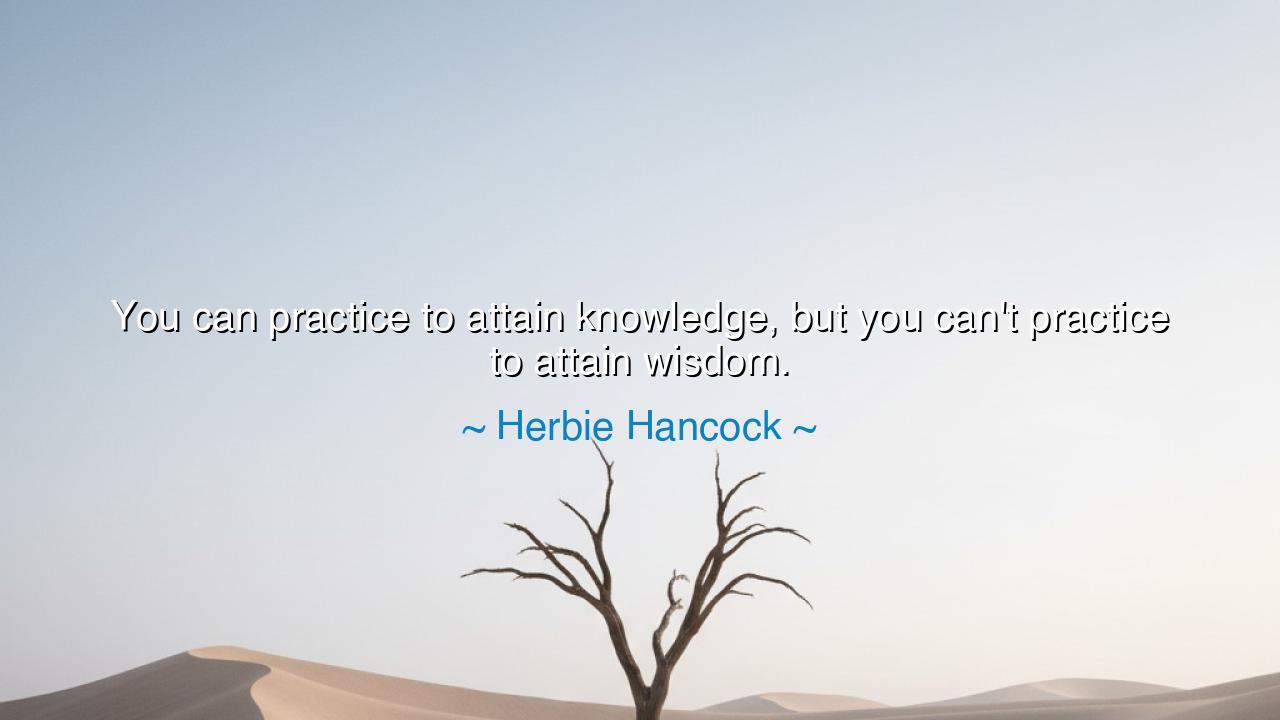
You can practice to attain knowledge, but you can't practice to






“You can practice to attain knowledge, but you can’t practice to attain wisdom.”
Thus spoke Herbie Hancock, master of sound and soul — a man whose fingers have danced across the keys of creation and whose mind has sought the harmony between intellect and spirit. In these words, he reveals a truth both subtle and profound: that knowledge and wisdom are not the same, and that the paths which lead to them differ as sunlight from flame. Knowledge can be studied, taught, and practiced, for it belongs to the realm of the measurable. But wisdom — ah, wisdom belongs to the realm of the infinite. It cannot be rehearsed or memorized; it must be lived. It is not learned from books but from being — from the quiet victories and deep wounds that shape the soul.
When Hancock speaks of practice, he speaks as a musician who knows the discipline of repetition, the daily pursuit of mastery. He understands that through effort, the hand may become precise, the ear discerning, the mind sharp. This is the road to knowledge, and it is noble. But the road to wisdom cannot be paved with practice alone, for wisdom is not a technique but a transformation. It blooms not from control, but from surrender — from listening to life as one listens to the pauses between the notes. In this way, the wise man is not one who conquers the world, but one who harmonizes with it. The musician can master the scales through repetition, but he masters himself only through experience — through humility, love, and the courage to fail.
The origin of this insight lies deep in Hancock’s own life. Born into a world of structure and training, he became one of the great innovators of jazz — a form of music that thrives not on perfection but on spontaneity, not on rigid knowledge but on living wisdom. In jazz, one may know every chord and pattern, yet still be unable to speak through music. To improvise — to feel the moment and respond — demands not practiced certainty, but presence. Thus, Hancock’s words are not abstract philosophy but the distilled truth of his art: that knowledge prepares the vessel, but wisdom fills it. One can practice for years to play perfectly, and yet only in letting go does one truly begin to play beautifully.
Consider, for example, the life of Siddhartha Gautama, who became known to the world as the Buddha. In his youth, he studied the teachings of sages, mastered philosophy, and practiced austerities with relentless discipline. He attained vast knowledge of the spiritual path — but not yet wisdom. For wisdom came only when he stopped striving and simply saw — when, sitting beneath the Bodhi tree, he beheld life as it truly is: fleeting, interconnected, whole. His enlightenment was not something practiced, but something realized — the fruit of inner stillness rather than outer struggle. Thus, like Hancock’s melody, wisdom arises not from doing more, but from being more aware.
The difference between knowledge and wisdom is the difference between sight and insight. Knowledge tells us what is; wisdom teaches us how to live with it. Knowledge is the map — intricate, detailed, full of facts — but wisdom is the journey itself, with its storms, its starlight, and its unexpected turns. A scholar may know the anatomy of a tree, yet never feel the life that moves through its roots and leaves. But the wise man — even if he cannot name a single part — feels in his heart the sacredness of the forest. Thus, knowledge fills the mind; wisdom awakens the soul.
And yet, Hancock does not dismiss practice; he honors it. For practice is the discipline through which we prepare ourselves to receive wisdom. One must learn before one can unlearn, must study before one can intuit. The pianist who has never practiced cannot play freely; the thinker who has never studied cannot see deeply. But once the foundation is laid, one must step beyond it. Practice ends where perception begins. Knowledge sharpens the tools; wisdom teaches us when, and how, to use them. So the true artist — and the true human being — lives in balance between discipline and surrender, mastery and mystery.
Therefore, O seeker of truth, take this teaching to heart: strive to know, but also learn to listen. Do not mistake the mastery of facts for the fullness of understanding. Practice your craft, study deeply, work hard — but remember that wisdom dawns only when the heart opens. Welcome failure, pain, and uncertainty, for these are the teachers that no classroom can provide. Walk through the world not as one who claims to know, but as one who yearns to understand. For knowledge makes you skilled — but wisdom makes you alive.
And so, the lesson of Herbie Hancock is this: Let your practice perfect your hands, but let life perfect your soul. Seek knowledge with the mind of a student, but receive wisdom with the heart of a poet. For wisdom cannot be practiced, only realized — in the stillness between thoughts, in the silence after the music, in the quiet recognition that the greatest truths are not learned, but remembered. And when at last you touch that inner knowing, you will find that it sings — softly, endlessly — the melody of life itself.






AAdministratorAdministrator
Welcome, honored guests. Please leave a comment, we will respond soon